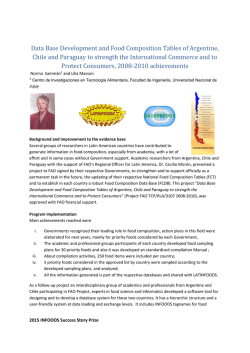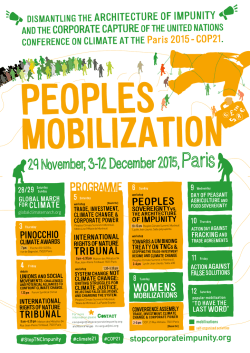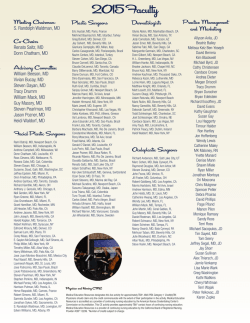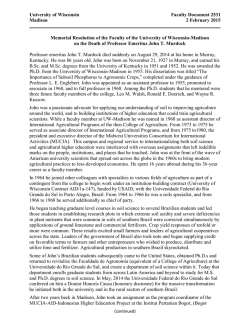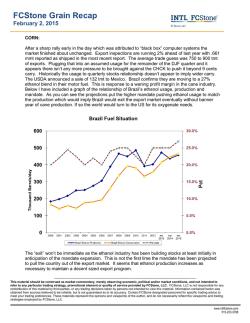
JOINT SIGN-ON STATEMENT FAO Symposium on Biotechnology
JOINT SIGN-ON STATEMENT FAO Symposium on Biotechnology: The biotechnology industry runs the show The undersigned representatives of peasant and other Civil Society organizations, men and women, express our concern and alarm about the FAO International Symposium on “The Role of Agricultural Biotechnologies in Sustainable Food Systems and Nutrition”1 to be held at FAO headquarters in Rome on 15-17 February 2016. We are concerned as to why FAO has decided to hold this Symposium, and why now. We remember the disastrous last attempt by FAO to act as an undercover agent for biotechnology companies, by organizing the International Technical Conference on Agricultural Biotechnologies in Developing Countries in Guadalajara, Mexico, in 2010.2 We are alarmed that FAO is once again fronting for the same corporations, just when these companies are talking about further mergers amongst themselves, which would concentrate the commercial seeds sector in even fewer hands. FAO should act as a knowledge center, rather than as a promoter of the ideological approach of the private sector. Unfortunately the program for this symposium is designed to showcase the "benefits" of GMOs, artificial genetic constructs created with possibly even more dangerous technologies, and other biotechnologies held by a handful of TNCs. Last year FAO hosted an international symposium on agroecology and three regional meetings to discuss with governments and civil society how to move the agroecology agenda forward.3 Those activities were much closer to the way that FAO should act, as a center for knowledge exchange, without a hidden agenda on behalf of a few. Yet in this case, truly useful peasant-based technologies must take a backseat to those that only serve to advance corporate profits. It is clear that, through the FAO, industry wants to re-launch their false message that genetically engineered crops can feed the world and cool the planet, while the reality is that nothing has changed on the biotech front. GMOs don't feed people, they are mostly planted in a handful of countries on industrial plantations for agrofuels and animal feed, they increase pesticide use, and they throw farmers off the land. 4 The industrial food system that it promotes is one of the main drivers of climate change.5 If anything, the situation has worsened over the past years: 1 http://www.fao.org/fileadmin/templates/agphome/agribiotech/Programme_Overview_detailed.pdf http://www.gmwatch.org/news/archive/2010/11990-fao-condemned-for-shameless-promotion-of-gmos62 3 http://www.fao.org/agriculture/crops/news-events-bulletins/detail/en/item/346167/icode/?no_cache=1 4 https://www.grain.org/e/4720 5 https://www.grain.org/e/5102 2 The quality of private sector agricultural research has been declining, even as their expenditures have increased, leading to vulnerability among seed and crop chemical input companies; As a result, mergers and acquisitions are being planned with, and among, the Big Six seed/pesticide corporations that already control 75% of global private sector research and development in agriculture; In desperation the surviving companies are calling for “climate-smart” agriculture, demanding protection from anti-cartel/competition regulators, pushing for more intellectual property rights and for increased public subsidies to allow them to go ahead with their plans. The same corporations are going beyond conventional GMO plant varieties toward “extreme biotech” strategies such as synthetic biology to create new genetic constructs, and trying, once again, to overturn the UN moratorium against Terminator seeds. Not only do they ignore the rights of farmers, they are using biotechnologies to patent plant genes that are already in peasants’ fields and that we have selected ourselves. With collaboration of the Seed Treaty, the so called Divseek program offers totally free access to all the gene sequences of the seeds that we have given free of charge to the gene banks. With the new biotechnologies for editing the genome, international corporations re-compose these genes in order to patent them. They want to forbid us to produce our own seeds and oblige us to buy their patented GMOs every year as well as their toxic pesticides, indispensable to grow those GMOs. In animal husbandry and fisheries where transgenic salmon and pigs already exist, we see the same scenario, the strengthening of industrial production and the increase in the use of antibiotics.... We remember the last time FAO allowed the biotech giants to push them into an international conference, in Guadalajara in 2010, at which the FAO worked hard, as in this case, to limit the involvement and participation of La Vía Campesina and other CSOs, and was publicly condemned for shameless promotion of GMOs by many organizations across the world6. Why does FAO limit itself to corporate biotechnology and deny the existence of peasant technologies? It is time to stop pushing this narrow corporate biotech agenda. The vast majority of the world's farmers are peasants, and it is peasants who feed the world. We need peasant-based technologies, not corporate biotechnologies. It is high time that FAO gets its priorities clear. Rather than allowing corporations to push their biotechnology agendas, FAO should forcefully pursue agroecology and food sovereignty as the path to feed the world and cool the planet! 6 http://www.gmwatch.org/news/archive/2010/11990-fao-condemned-for-shameless-promotion-of-gmos62 International and Regional Organizations ActionAid International African Biodiversity Network (ABN) Alliance for Food Sovereignty in Africa (AFSA) Asian Peasant Coalition (APC) Asian Peoples Movement on Debt and Development (APMDD) Campaña Mesoamericana para la Justicia Climática CICODEV Africa Coordinación Regional del Frente Parlamentario contra el Hambre de América Latina y el Caribe Comité pour l’Annulation de la Dette du Tiers Monde (CADTM International) Coopération Internationale pour le Développement et la Solidarité (CIDSE) Corporate Europe Observatory (CEO), Brussels ETC Group Focus on the Global South India, Thailand and Philippines Friends of the Earth International Global Campaign to Dismantle Corporate Power and Stop Impunity GRAIN Greenpeace International Growth Partners Africa –GPA Indigenous Peoples of Africa Co-ordinating Committee (IPACC) International Indian Treaty Council (IITC) La Via Campesina Movimiento Agroecológico de América Latina y el Caribe (MAELA) NO VOX INTERNATIONAL Pan-Africanist International Pelum Association, Africa Plataforma Interamericana de Derechos Humanos, Democracia y Desarrollo (PIDHDD Regional) Red interamericana de economía solidaria de latinoamérica y el caribe. RIPESS LAC Red por una América Latina Libre de Transgénicos Red de Acción en Plaguicidas y sus Alternativas para América Latina (RAPAL) RIPESS Europe RIPESS Intercontinental Slow Food Society for International Development (SID) Solidarity Economy Europe Transnational Institute (TNI) Urgenci Europe Urgenci International Network World Forum of Fisher People (WFFP) World Public Health Nutrition Association World Rainforest Movement (WRM) National and Local Organizations Acción Ecológica, Ecuador ADTM International, Belgium African Center for Biodiversity, South Africa and Tanzania Agriculture Sovereignty Ghana AGRECOL, Germany AIAB, Italy ALIANZA DERECHO HUMANO A LA ALIMENTACIÓN –ADHAC, , Guatemala Alianza por una Mejor Calidad de Vida/Red de Acción en Plaguicidas de Chile, RAPChile Alliance for Food Sovereignty in Africa (AFSA) Alliance for Sustainable & Holistic Agriculture (ASHA), India ALTERNATIVAS (COMCAUSA), Mexico AMAR Environment Defense Association, Brazil APROMAC Environment Protection Association, Brazil Articulação de Agroecologia na Bahia- (AABA), Brazil Articulação Semiárido Brasileiro (ASA), Brazil Asian Peasant Coalition (APC) Asian Peoples Movement on Debt and Development (APMDD) Associação Brasileira de Agroecologia (ABA), Brazil Associação Gaúcha de Proteção ao Ambiente Natural (AGAPAN), Brazil Associação para o Desenvolvimento da Agroecologia (AOPA), Brazil Association Citoyenne de Défenses des Intérêts Collectifs (ACDIC), Cameroon ATTAC Argentina ATTAC France ATTAC CADTM, Morroco Attac Côte d'Ivoire Australian Food Sovereignty Allianc BioScience Resource Project, USA Bread for the World, Germany CADTM, Maroc Campaña Yo No Quiero Transgénicos, Chile Censat Agua Viva - Amigos de la Tierra, Colombia Center for Research and Documentation Chile-Latin America, Germany Centre Europe-Tiers Monde (CETIM), Switzerland Centro de Derechos Humanos "Fray Francisco de Vitoria OP", A.C., Mexico CENTRO DE DIREITOS HUMANOS E EMPRESAS (HOMA), UFJF, Brazil Centro de Documentación en Derechos Humanos “Segundo Montes Mozo S.J.” , Ecuador Centro Ecologico, Brasil Çiftçi-SEN (Confederation of Farmers' Unions), Turkey CSMM, Ecuador CCFD-Terre Solidaire, France Coalition for a GM-Free India, India Coldiretti, Italy Colectivo Revuelta Verde, Mexico Colectivo VientoSur, Chile Comité Permanente por la Defensa de los Derechos Humanos, Ecuador Community to Community, USA Comunidades Campesinas y Urbanas Solidarias con Alternativas, México Conselho Nacional das Populações Extrativistas (CNS), Brazil Cooperativa por un Ambiente Biodiverso y Sustentable, CAMBIOS, S.C., Mexico Cooperativa Semilla Austral, Chile Coordinadora de Movimientos Populares para la Integración Latinoamericana Coordination Climat Justice Sociale, Switzerland Earthlife Africa, South Africa Ecologistas en Acción, Spain Ekologistak Martxan, Spain Educación, Cultura y Ecología, A. C. (Educe AC.), Mexico FASE - Federação de Órgãos para Assistência Social e Educacional, Brazil Food First, USA Food Sovereignty Ghana Foro Ciudadano de Participación por la Justicia y los Derechos Humanos, Argentina Friends of the Earth U.S.A. Fronteras Comunes A.C., Mexico Fundación de Estudios para la Aplicación del Derecho (FESPAD), El Salvador Fundación Mundubat, Basque Country GE Free New Zealand Générations Futures, France Global Justice Alliance, USA Grupo Coletivo Triunfo de Agricultores Familiares, Brazil Grupo de Agroecología y Soberanía Alimentaria (GASA), Panama Grupo de Coordinación Ampliado del Grupo Carta de Belém, Brazil GUERREROS VERDES A.C., Mexico Institute for Agriculture and Trade Policy, USA Institute for Research and Promotion of alternatives in development (IRPAD), Mali Instituto de Estudios Ecologistas del Tercer Mundo, Ecuador Jubileu Sul, Brasil Kenya Biodiversity Coalition Kenya Food Rights Alliance – KeFRA Kenya Food Rights Alliance –KeFRA La Asamblea Veracruzana de Iniciativas y Defensa Ambiental (LAVIDA) Laboratorio de Investigación en Desarrollo Comunitario y Sustentabilidad, Mexico La Fédération Unie de Groupements d’Eleveurs et d’Agriculteurs (FUGEA), Belgium Living Farms, India Marcha Mundial de las Mujeres, Chile MASIPAG, Philippines Mesa Nacional frente a la Minería Metálica (MNFM), El Salvador Mesa Permanente por la Justicia Laboral (MPJL), El Salvador Millennium Institute, USA Mouvement "Nous Sommes la Solution", Senegal Mouvement d'Action Paysanne (MAP), Belgium Movement Generation, USA Movimiento de los Pequenos Agricultores-MPA, Brazil Movimiento Nacional en Defensa de la Tierra (MOVITIERRA), El Salvador Navdanya, India Never Ending Food, Malawi Organic Systems, New Zealand Other Worlds, USA PACS - Institute Alternative Policies for the Southern Cone of Latin America, Brazil PAPDA, Haïti Peuples Solidaires-ActionAid, France PLATAFORMA DE ECONOMÍA SOLIDARIA (PECOSOL), Guatemala rede de Comunidades Tradicionais Pantaneira, Brazil Rede Ecovida de Agroecologia, Brazil Red de Accion por los Derechos Ambientales (RADA), Temuko,Chile. RED DE HUERTOS URBANOS DE TALCA, Chile Red de Semillas Libres de Chile RED SOCIOAMBIENTAL SEMILLAS, Chile Red Mexicana de Acción Ecológica y Pacifista [Red ECOPAZ] RELUFA (Network for the Fight Against Hunger), Cameroon Save Our Seeds, Germany Semillas de Vida, Mexico Serviço de assessoria a organizações populares rurais (SASOP), Brazil Solidaridad Suecia - América Latina, Sweden South Durban Community environmental Alliance, South Africa Sri Lanka Nature Group Sunray Harvesters, India Sustainable Agriculture Tanzania (SAT) Tanzania Alliance for Biodiversity (TABIO), Tanzania Tanzania Organic Agriculture Movement (TOAM), Tanzania Tarım Orkam-Sen, Turkey Terra de Direitos, Brazil Terra Nuova, Italy The Zambia Alliance for Agroecology and Biodiversity Conservation TOXISPHERA Environmental Health Association, Brazil Trust for Community Outreach and Education (TCOE), South Africa Unidad de la Fuerza Indígena y Campesina (UFIC), México Unidad Ecológica Salvadoreña (UNES), El Salvador Union of Agricultural Work Committees (UAWC), Palestine US Food Sovereignty Alliance, USA USC CANADA Vía Orgánica, Mexico War on Want, UK WhyHunger, USA
© Copyright 2026
